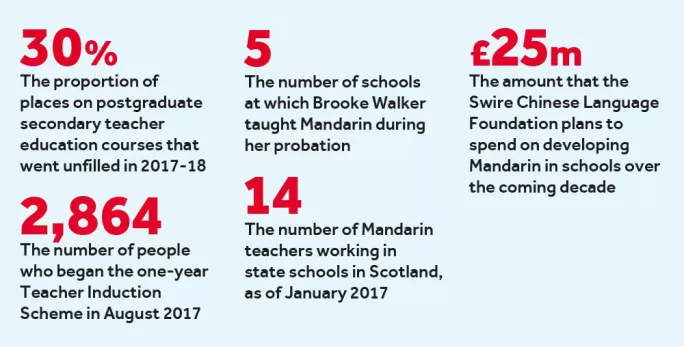Fresh faces and tough timetables

Brooke Walker is unusual. For a start she is a Mandarin teacher - one of only around a dozen working in Scottish state schools.
She is also a probationer but has never had her own classroom. And while she is employed by a private school, George Watson’s College, her wages are paid by a charitable foundation and she works in five state schools. These schools include both primaries and secondaries, and range from among the most advantaged in Edinburgh to the most disadvantaged.
Walker (pictured below) has taught her subject at Higher at one of Scotland’s top-performing state schools, James Gillespie’s High. Meanwhile, at Castlebrae Community High - which has a roll of just 160 pupils and serves one of the most deprived areas of Edinburgh - she is planning to take the 12 teenagers who have opted to continue with Mandarin to Beijing in October, along with another 12 from the city’s Tynecastle High.

Seven of the Castlebrae pupils needed to order passports because this will be their first trip abroad. “I’m more excited than the kids because I know what they are going to see and experience,” Walker says.
The Scottish Council of Independent Schools - which represents the majority of schools in the private sector - has singled Walker out as an exceptional probationer. Her achievements and those of some of the other 2,500-plus probationers who have cut their teeth in schools across Scotland this year were celebrated at an event hosted by the General Teaching Council for Scotland in Edinburgh last week.
Recruitment issues
How to attract more teachers like these into the profession is a question preoccupying many in the sector. Universities have been charged with recruiting more students but they are struggling to hit their targets for secondary teaching courses.
At the event, S6 pupils from Dunfermline High School had the chance to pose three questions to the education secretary John Swinney. They asked how he planned to make teaching more attractive. He responded that perceptions of the profession had to change, career progression routes must be improved and pay must be increased.

There were not enough incentives to keep fabulous teachers teaching, he said, adding that he was also keen to make sure there was “progress on pay”. People do not generally come into teaching for the money, he acknowledged, but they should be “properly remunerated for educating the next generation of young people in society”.
History teacher Emma Cooper, who is just coming to the end of her probation at Farr High, near Thurso in Caithness, does not think pay is the issue, but she agrees with Swinney that there is a problem with the way the profession is perceived. Teaching needs to be seen as an exciting career in its own right, she says, and not just something to fall back on if you have a degree and run out of options.
Cooper decided to enter the profession after teaching English in China for a year and enjoying being around young people. “I love my job,” she says. “I could not imagine sitting in an office working with a bunch of adults. That just seems so boring now.”
Meanwhile, newly qualified languages teacher Kerry Carter - who also enthuses about her probationary year, spent at St Machar Academy in Aberdeen - believes more support in the classroom is the key. Even those who want to join the profession are being put off because they witness the lack of support for teachers when they go out on placement as students, she says.
For her part, Walker realises that she has had something of a baptism of fire, but says she is glad of it. Before her timetable changed this month, she could be teaching in four different schools in the course of one day.
“I could not have asked for a better experience in my first year because I’ve learned so much,” Walker says. “If I’d had my own school and my own classroom I would have been able to do things so easily. This way, the learning curve has been really steep, but I’ve really enjoyed the freedom of going to different schools and meeting different departments and taking ideas from different staff in different schools.”
You need a Tes subscription to read this article
Subscribe now to read this article and get other subscriber-only content:
- Unlimited access to all Tes magazine content
- Exclusive subscriber-only stories
- Award-winning email newsletters
Already a subscriber? Log in
You need a subscription to read this article
Subscribe now to read this article and get other subscriber-only content, including:
- Unlimited access to all Tes magazine content
- Exclusive subscriber-only stories
- Award-winning email newsletters